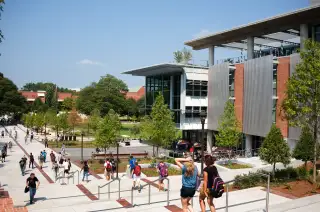These Are the Only Colleges That Regularly Give Students a $1 Million Payoff

If you want to set yourself up for earning big after college, you can't just bank on having a degree from a specific school or pursuing a certain profession. More often than not, you have to figure out the perfect way to pair the two.
Fortunately, PayScale has already done it for you.
The compensation website released last week its 2018 College ROI Report, an annual research project that relies on salary data collected from some 1.4 million survey respondents over the past decade. Among PayScale's different data breakdowns, one identified the best value colleges by career path—essentially, publishing a list of the college-plus-career combinations that have given alumni the highest net 20-year returns on investment.
That analysis found 19 cases where that ROI totaled $1 million or more, even before taking a school's typical financial aid into account. (This type of analysis tends to favor public schools, where tuition is lower. Private universities that tend to have higher sticker prices but greater aid to students do better when the analysis factors in the college's net price, after aid—and indeed, an ROI analysis that factored financial aid showed a much greater set of million-dollar combinations, more than half at private institutions.)
To determine the rankings, the PayScale team calculated the difference between bachelor's degree recipients' median pay over 20 years and high school graduates' earnings over 24 years. (The latter group counts a longer period of income because, as the thinking goes, university students lost out on paychecks while they were in college.) It then subtracted college costs, considering whether students paid in-state or out-of-state tuition rates. Some institutions appear on the list more than once if they offered a high payoff to both in- and out-of-state students.
Predictably, the results are dominated by career paths in science, technology, engineering and math: so-called STEM fields that we already know tend to pay more than normal. Ten of the 19 cases were linked to alumni securing employment in computer and mathematical occupations—a job category that, according to the Bureau of Labor Statistics, includes software developers, information security analysts, programmers, database administrators and more.
"Generally speaking, with computer and mathematical occupations, there's just been a surge in demand in those roles over the past 10 years or so," PayScale chief economist Katie Bardaro tells Money. "STEM isn't going away any time soon, so pursuing majors in STEM is a really good opportunity."
Service schools also showed up on the list, with both the U.S. Military Academy and Merchant Marine Academy appearing twice. Bardaro suggests that this was partly because those institutions have such a low cost of attendance: West Point pays for students' tuition, and the Merchant Marine Academy charges only about $1,000 for tuition and fees.
"When you're thinking of ROI, that's immediately a cost reduction," she adds.
The list includes big-name private schools like MIT and Stanford, but also public institutions like the University of California - Berkeley.
Berkeley spokesman Dan Mogulof says he thinks the results can help counter outdated views of the school. While the campus was the site of famous Free Speech Movement protests in the 1960s, Berkeley students now have a long-term track record of finding high-paying jobs.
Mogulof attributes that to a couple of factors. First, he says, the college's faculty members "have feet in both worlds—academically and the real world," which makes it easier for students to make professional connections.
Berkeley also has a lot of alumni engagement in a region with high-paying jobs, he adds, with the campus located about an hour away from Silicon Valley: "We have a pretty good sense of what's going on out there."
Some of Berkeley's graduates say the campus advantages predate Silicon Valley. Alumnus Jolen Flores, a 70-year-old retired aerospace engineer living in the San Francisco area, gives the campus at least partial credit for his lengthy and lucrative career at NASA. "I enjoyed learning not only in the classrooms but from the progressive open-minded thinking that is nurtured at Cal," he tells Money. "I loved my life at Berkeley."
Of course, college salary data can be an imperfect science. As Inside Higher Ed pointed out last year, PayScale draws conclusions from self-reported data volunteered by survey respondents, meaning it doesn't have the same amount of information for every school.
However, PayScale's numbers still offer solid guidance for students trying to pick a college. Bottom line? While these schools and careers don't necessarily guarantee a lifetime of profits, they're definitely a good place to start.
Dive into the numbers for yourself here.